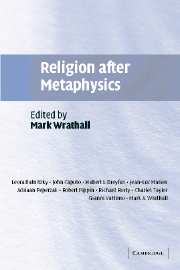Book contents
- Frontmatter
- Contents
- List of contributors
- Preface
- 1 Introduction: metaphysics and onto-theology
- 2 Love and death in Nietzsche
- 3 After onto-theology: philosophy between science and religion
- 4 Anti-clericalism and atheism
- 5 Closed world structures
- 6 Between the earth and the sky: Heidegger on life after the death of God
- 7 Christianity without onto-theology: Kierkegaard's account of the self's movement from despair to bliss
- 8 Religion after onto-theology?
- 9 The experience of God and the axiology of the impossible
- 10 Jewish philosophy after metaphysics
- 11 The “end of metaphysics” as a possibility
- Index
9 - The experience of God and the axiology of the impossible
Published online by Cambridge University Press: 21 May 2010
- Frontmatter
- Contents
- List of contributors
- Preface
- 1 Introduction: metaphysics and onto-theology
- 2 Love and death in Nietzsche
- 3 After onto-theology: philosophy between science and religion
- 4 Anti-clericalism and atheism
- 5 Closed world structures
- 6 Between the earth and the sky: Heidegger on life after the death of God
- 7 Christianity without onto-theology: Kierkegaard's account of the self's movement from despair to bliss
- 8 Religion after onto-theology?
- 9 The experience of God and the axiology of the impossible
- 10 Jewish philosophy after metaphysics
- 11 The “end of metaphysics” as a possibility
- Index
Summary
Who would not want to have an experience of God? But if no one has seen God and lived, who would want to risk it? Would this experience be some very extraordinary and death-defying event, like landing on the moon or being abducted by aliens? Or would it rather be a much calmer, cooler, and more calculated affair, like trying to read extremely complex computer data from the Galileo telescope that only a few highly trained experts can understand? What would “experience” mean if one had an experience of God and, for that matter, what would “God” mean if God could be experienced?
Rather than engage in any speculative adventure, I will keep close to the phenomenological ground, for phenomenology, which is nothing but the cartography of experience, is what for me comes “after onto-theology.” Although I will speak of a certain leap, what I offer here is a careful explication of what is going on here below, in experience. On that basis, then, let me pose a risky hypothesis: I will venture the idea that the very idea of “experience” drives us to the idea of God – which may sound at first a little bit like the dream of an “absolute empiricism” that Derrida discusses at the end of “Violence and Metaphysics” – and in a strictly parallel way that the very idea of “God” is of something that (or of someone who) sustains and sharpens what we mean by experience, with the result that the “experience of God” requires a “God of experience.”
- Type
- Chapter
- Information
- Religion after Metaphysics , pp. 123 - 145Publisher: Cambridge University PressPrint publication year: 2003
- 5
- Cited by

